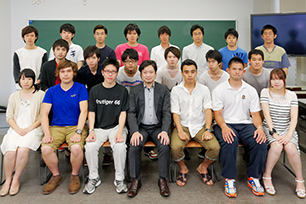Ken Jimbo, Associate Professor, Faculty of Policy Management
Learning the Conceptual Framework and Practice of International Security
Amidst the drastic changes to the contemporary security environment, students’ interest in foreign affairs and international security is on the rise.
In Prof. Jimbo's seminar class, close to twenty students press forward with research through multi-disciplinary approaches.

Over the span of nearly eight years since I joined the Faculty of Policy Management, the situation of international security across the globe has changed dramatically. When I first arrived, the focus of international relations was on the impact of 9/11, a renewed threat of international terrorism, and the following wars in Afghanistan and Iraq. Today we see new problems have surfaced, especially in northeast Asia, with the rise of China and instability in North Korea and challenges to areas such as marine, cyber, and space defense.
In our seminar, we take note of the conceptual framework in a policy-oriented approach to research of contemporary issues surrounding international security. Students in the seminar break off into groups to conduct month-long group work (joint research) based on common research themes. During Spring Semester 2013, research was presented on research themes such as "The U.S. Rebalance to East Asia," "Terrorism in India," "The Arab Spring and the Libyan Civil War," and "The Somalian Civil War and Construction of Peace."
One of the practical characteristics of this seminar is the implementation of "crisis simulation" to possible contemporary international crises. Students take on the roles of leaders and ministers to learn how to address issues through international negotiations. Last semester, we performed a four-hour long simulation over the Iranian nuclear issue, dividing students into teams of Iran, the U.S., Israel, Russia, the European Union, and China. Students are then required to grapple with writing final papers and their bachelor's theses based on their research plans.
In recent years, the seminar has taken on a distinctly cosmopolitan feel as more and more students of non-Japanese descent interact with Japanese students in the classroom. Through their conversations, I get the impression that students' perceptions of world affairs have started to hit closer to home. I believe we must remain dedicated to hard-edged research precisely because international security is an area where national interests and human lives are on the line.
Student’s Voices
Naoyuki Matsuda
Fourth-year, Faculty of Environment and Information Studies
What learning about "International Security" means now
In Prof. Jimbo's seminar, we students deepen our understanding of international security through individual research and group work. Research themes vary greatly, from regional conflict and bilateral relations to nuclear issues and terrorism, as each student is free to choose an area which interests them. We conduct group work on our research, and this comprises one of the major activities done in the first half of the semester. It can be grueling; it isn't uncommon for us to stay overnight at school, but the sense of achievement upon completion makes the whole task worthwhile.
Though concept of international security may change with the times, I believe that the knowledge and skills we acquire in Prof. Jinbo's seminar will always be relevant. Ideally, I would like to be able to look at our world squarely in the face, even as it changes in ten or twenty years' time.
*Position titles, etc., are those at the time of publishing.
